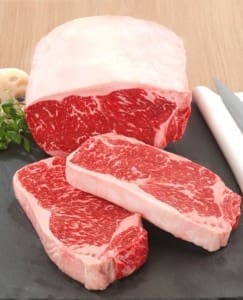WHILE the Wagyu beef industry to this point has built its reputation among global consumers based on its high levels of marbling and eating quality, the industry is now beginning to zone-in on some of the unique health benefit qualities that Wagyu beef possesses.
Just as salmon is now universally seen as a desirable ‘healthy protein’ among the diet-conscious, research has shown that Wagyu beef possesses fatty acid profiles unique in the beef protein field, that have potential to be promoted the same way.
Speaking at the National Wagyu Conference being held this week in the Hunter Valley is the world’s leading researcher on the ‘healthiness’ of marbled Wagyu beef, Dr Stephen Smith from Texas A & M University.
Dr Smith will present his latest findings which reconfirm that Wagyu beef contains extraordinary amounts of mono-unsaturated ‘healthy’ oleic acids – and the benefit is seen to increase with the amount of marbling and days-on-feed.
Oleic acids are highly regarded by nutritionists for a range of health-giving properties, including their anti-oxidant and cholesterol lowering effects.
Almost 400 delegates representing the entire spectrum of the Wagyu beef supply chain – from seedstock and commercial cattle producers to feedlot operators, processors, exporters and branded beef program managers will gather at Pokolbin for this year’s national Wagyu conference.
It is arguably the biggest breed-derived national industry meeting ever held – larger even than last year’s World Wagyu Congress in Rockhampton.
Worldwide demand for Australian Wagyu beef has led to a boost in prices for cattle producers using Wagyu genetics. At present, while 400kg feeder steers from conventional breeds are making 285-300c or around $1200, first-cross Wagyu F1s of the same weight have been making close to $6/kg.
This premium has generated a significant shift by some cattle producers into Wagyu F1 production. During the conference, the Australian Wagyu Association’s chief executive Graham Truscott will reveal growth levels and predictions for future growth which he predicts will see Wagyu become a major influence in the Australian beef cattle herd.
“Membership has grown 32pc and registrations of cattle by 20pc over the past 12 months, and registrations are predicted to triple in the next three years,” Mr Truscott said.
Healthiness in all foods is a key focus in modern dietary habits, and none more so than for products at the premium price point. Customers willing and able to pay for the best expect the best, and that often equates to health benefits.
Guest speaker Stephen Smith is a Regents Professor of meat science in the Department of Animal Science at Texas A&M University, and a member of the Intercollegiate Faculty of Food Science and Technology and the Intercollegiate Faculty of Nutrition.
His primary contribution to the animal sciences has been the documentation of the nutritional and genetic regulation of the concentration of oleic acid in animal tissues.
Dr Smith published some of the earliest research to document that Japanese Black (Wagyu) cattle, known for their ability to accumulate marbling, also had unusually high concentrations of oleic acid in their muscle and adipose tissues.
Beginning in 1991, Dr Smith began collaborative research with scientists at Kyoto University in Japan on the subject, which lasted for over 10 years.
- The National Wagyu conference runs from May 2 and 4 at Crowne Plaza at Lovedale, near Pokolbin. Beef Central will provide reports during the event.

